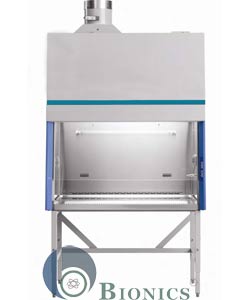The Growing Craze About the Class 2 Biosafety Cabinets
The Growing Craze About the Class 2 Biosafety Cabinets
Blog Article
Enhancing Laboratory Safety with Class 2 Biosafety Cabinets and Microbiological Protection

Modern laboratories prioritise safety for workers, materials, and environments. Whether it's conducting biological tests, diagnostics, or experiments with infectious agents, biosafety cabinets play an integral role in contamination prevention and sample integrity.
Among the available options, Class 2 Biosafety Cabinets stand out for their balanced protection. These units are indispensable tools for pathogen handling and biological research.
Overview of Biosafety Cabinets in Laboratory Environments
Biosafety cabinets are ventilated enclosures built to protect both users and biological materials. They use advanced filters to trap harmful particles before air re-enters the lab.
These units are generally classified into three categories—Class I, Class II, and Class III. Among these, Class 2 biosafety cabinets are the standard choice for most applications.
What Are Class 2 Biosafety Cabinets?
Class 2 Biosafety Cabinets ensure safety on all fronts—personnel, workspace, and biological material. They direct filtered airflow in a laminar pattern over the work surface.
Contaminated air is drawn into the cabinet and filtered through HEPA systems before recirculation or exhaust. These cabinets are suited for clinical, research, and pharmaceutical lab applications.
Essential Features of Class 2 Safety Cabinets
A Class 2 microbiological safety cabinet includes several advanced features such as:
• HEPA/ULPA filtration to trap microbes and particles
• Laminar airflow that minimises disruption and contamination
• Negative pressure barriers to prevent leakage
• Optional UV lights for overnight sterilisation
• Low sound emissions to reduce fatigue
• Transparent sash or viewing window for easy access and monitoring
These elements support lab workers in maintaining sterile working environments.
Where Class 2 Cabinets Are Used
Class 2 Biosafety Cabinets are widely deployed in clinical labs, vaccine R&D, and academic research. They are indispensable for handling clinical specimens, blood cultures, and biological reagents.
Hospitals, research labs, and manufacturing units depend on these cabinets for contamination control.
Advantages of Installing Class 2 Cabinets in Your Lab
Using Class 2 cabinets offers numerous benefits for safety, accuracy, and lab hygiene:
• Protects the integrity of lab work
• Shields operators from harmful aerosols and pathogens
• Ensures filtered air is safe for release or recirculation
These cabinets microbiological safety cabinet combine safety features with operational efficiency.
Regulatory Standards for Class 2 Cabinets
Top manufacturers ensure their cabinets meet certifications like NSF 49, EN 12469, and WHO recommendations. Class 2 units are sub-classified as A1, A2, B1, and B2—each with distinct airflow and exhaust features.
• Type A2: Most commonly used cabinet model
• Type B2: Suited for labs dealing with toxic agents
Matching the cabinet type to your process is essential.
Tips for Purchasing the Ideal Biosafety Cabinet
Before purchasing, consider:
• Your application type (e.g., diagnostics, pharma, research)
• Cabinet dimensions, ducting needs, and room layout
• Energy consumption and maintenance frequency
• Warranty, training, and certification services
Consulting with experts ensures the cabinet fits both budget and compliance goals.
Best Practices for Using Class II Biosafety Cabinets
For optimal results:
• Install the cabinet in a draft-free, low-traffic zone
• Get periodic validation from certified technicians
• Ensure operators follow best practices
Operational best practices include:
• Maintain biosafety gear protocols
• Minimise hand movements inside the cabinet
• Decontaminate surfaces before and after use
• Use UV lights only when cabinet is off and unoccupied
Final Thoughts on Class 2 Biosafety Cabinets
Class 2 biosafety cabinets are vital equipment in laboratories dealing with biohazards. They safeguard both research outcomes and operator health.
From pathology labs to advanced genetic testing, Class II cabinets maintain sterility in sensitive procedures. When investing in a biosafety cabinet, prioritise compliance, usability, and long-term support—because your research deserves the best protection. Report this page